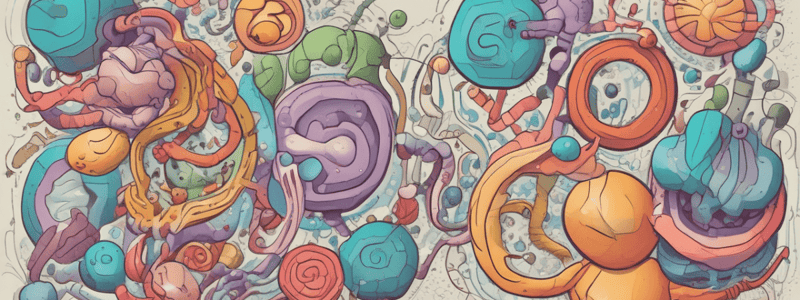Podcast
Questions and Answers
What is the primary function of proteins in the body?
What is the primary function of proteins in the body?
To provide the necessary building blocks for the creation of a wide array of important biological compounds.
What is the basic structural unit of proteins, and what are its components?
What is the basic structural unit of proteins, and what are its components?
Amino acids are the basic structural unit of proteins, and they are composed of carbon, hydrogen, oxygen, and nitrogen atoms.
Why do many Americans associate meat with protein and a lack of protein with poor muscular development and weak muscular strength?
Why do many Americans associate meat with protein and a lack of protein with poor muscular development and weak muscular strength?
This association is likely due to cultural and historical influences, as well as the fact that meat is a rich source of protein.
What is the difference between essential and nonessential amino acids?
What is the difference between essential and nonessential amino acids?
How do proteins differ from lipids and carbohydrates in terms of their chemical composition?
How do proteins differ from lipids and carbohydrates in terms of their chemical composition?
What is the significance of proteins in the context of nutrition and health?
What is the significance of proteins in the context of nutrition and health?
What is an example of a protein-rich food that is often overlooked as a source of protein?
What is an example of a protein-rich food that is often overlooked as a source of protein?
What is the analogy used to describe the relationship between nutrients in the body?
What is the analogy used to describe the relationship between nutrients in the body?
What are the major functions of proteins in the human body?
What are the major functions of proteins in the human body?
What is the role of proteins in maintaining fluid balance in the body?
What is the role of proteins in maintaining fluid balance in the body?
What is the consequence of a decreased level of protein in the blood during starvation or chronic illnesses?
What is the consequence of a decreased level of protein in the blood during starvation or chronic illnesses?
What is the pH range at which blood and tissue fluids need to maintain to function properly?
What is the pH range at which blood and tissue fluids need to maintain to function properly?
What is the role of proteins in the bloodstream?
What is the role of proteins in the bloodstream?
What type of proteins are hormone insulin and glucagon?
What type of proteins are hormone insulin and glucagon?
What is the function of neurotransmitters in the body?
What is the function of neurotransmitters in the body?
What is the primary role of enzymes in the body?
What is the primary role of enzymes in the body?
What is the consequence of an imbalance in protein levels in the diet?
What is the consequence of an imbalance in protein levels in the diet?
What is the function of collagen and keratin in the body?
What is the function of collagen and keratin in the body?
What are the three groups of atoms that anchor to the carbon atom in an amino acid?
What are the three groups of atoms that anchor to the carbon atom in an amino acid?
What is the function of the basic portions of protein molecules in maintaining the normal pH of a solution?
What is the function of the basic portions of protein molecules in maintaining the normal pH of a solution?
How many amino acids are essential for the human body, and what does this mean?
How many amino acids are essential for the human body, and what does this mean?
What is the carbon skeleton of an amino acid, and what is its significance?
What is the carbon skeleton of an amino acid, and what is its significance?
What is taurine, and what are its functions in the body?
What is taurine, and what are its functions in the body?
Why are some nonessential amino acids considered 'conditionally essential'?
Why are some nonessential amino acids considered 'conditionally essential'?
What is the significance of the R group in an amino acid?
What is the significance of the R group in an amino acid?
How do proteins help maintain the normal pH of tissues?
How do proteins help maintain the normal pH of tissues?
What is the significance of the nitrogen-containing group in an amino acid?
What is the significance of the nitrogen-containing group in an amino acid?
Why is taurine added to energy drinks, and is there scientific evidence to support its effectiveness?
Why is taurine added to energy drinks, and is there scientific evidence to support its effectiveness?
Study Notes
What Are Proteins?
- Proteins are complex organic molecules that are chemically similar to lipids and carbohydrates, but they contain nitrogen, an element cells need to make important biological compounds.
- Proteins are the only macronutrient that contains nitrogen.
- Plants, animals, bacteria, and even viruses contain hundreds of proteins.
Functions of Proteins in the Body
- Proteins are necessary for muscle development and maintenance.
- Proteins have a wide variety of functions, including:
- Making or functioning as new cells and many components of cells
- Structures such as hair and nails
- Enzymes
- Lubricants
- Clotting compounds
- Antibodies
- Compounds that help maintain fluid and pH balance
- Certain hormones and neurotransmitters
- Energy source (minor, under usual conditions)
- Proteins are necessary for blood to clot properly.
- Proteins in the bloodstream transport nutrients and oxygen.
- Proteins help maintain the proper distribution of fluids in blood and body tissues.
Amino Acids
- Proteins are composed of smaller chemical units called amino acids.
- The human body contains proteins made from 20 different amino acids.
- Each amino acid has a carbon atom that anchors a hydrogen atom and three different groups of atoms: the amino or nitrogen-containing group, the R group, and the acid group.
Classification of Amino Acids
- Nutritionists classify amino acids as either nonessential or essential according to the body's ability to make them.
- Nonessential amino acids are those that the body can make.
- Essential amino acids are those that must be supplied by foods because the body cannot synthesize them or make enough to meet its needs.
- There are 9 essential amino acids and 11 nonessential amino acids.
- Some nonessential amino acids are "conditionally essential," which means they become essential in certain situations.
Studying That Suits You
Use AI to generate personalized quizzes and flashcards to suit your learning preferences.
Description
Understand the primary function of proteins in the body, their basic structural unit, and how to classify amino acids as essential or nonessential. Learn about the historical significance of protein consumption for optimal health and performance.




